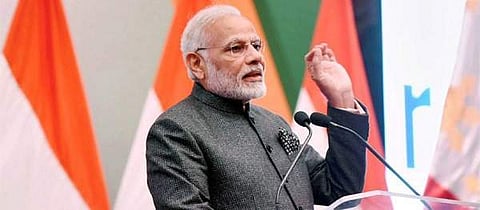

Since early 2017 when the US leadership changed hands, there have been challenging occurrences in geopolitics around the world. India being a regional power, with interests in both the Indian and Pacific Oceans, has found itself in a position of prominence as an important swing nation.
For India, Doklam was an important landmark. Although the handling by the government was creditable, it was also inevitable that perceiving moral victory at the border was the worst way to view the post-event scene. It would have set up an unfortunate clash of interests with China. Thus Prime Minister Narendra Modi’s recent visit to Wuhan was a calculated one which proved win-win for both nations.
Cooperation rather than confrontation appears to have returned. In 2014, when Modi came to power, one of his early gestures in foreign policy was towards China. However, shortly thereafter India got swept onto the channel of cooperative security, starting with what appeared as an India-US-Japan axis. From an Indian angle it was all about investments, trade, and availability of technology with the modern day phenomenon of naval cooperation and other military exercises. I had assessed in 2014 too that if anything would worry China it would be such equations.
The best evidence of India’s signals of change in foreign policy comes from its recent attendance of the conference of the Quad of Nations where its stance was quite different to the other three nations. No one missed Modi’s summation of Indian foreign policy at the annual Shangri-La Dialogue. There wasn’t any reference to the Quad of Nations and even to the renaming of the US-Pacific Command as Indo-Pacific Command.
Modi stated emphatically that ‘our friendships are not alliances of containment’, signalling a strong sentiment to China on what had worried it in the recent past. Writing in the South China Morning Post, Zhou Bo—one of China’s prominent strategic writers—refers to Sino-Indian relations: “If the two countries are not at loggerheads, they may indeed usher in an Asian century.”
While a strategic upswing in the Indo-US relationship was and is still being considered majorly beneficial to India, perhaps the Indian strategic community’s long-felt notion that leaning far too much in any one direction is never beneficial in the long run, is once again prevailing. Some are even terming it an Indian return to neo non-alignment. The US response to India’s pursuance of the deal involving the Russian S-400 air defence (AD) system has been largely negative. The five Triumf AD systems costing $4 billion or more that India is seeking has led to the potential evoking of Countering America’s Adversaries through Sanction Act (CAATSA) that imposes sanctions on a country or utility for any significant purchase of military equipment from Russia.
While US Secretary of State Michael Pompeo has indicated potential waiver for India, the same could be viewed as limited coercion. India’s long-standing arms and equipment relationship with Russia cannot easily be risked. Modi’s visit to Sochi in Russia after his meeting with Xi Jinping at Wuhan was indicative of the manner in which the Indian foreign policy establishment was viewing the importance of Russia.
The Shanghai Cooperation Organisation (SCO) of which India and Pakistan are now full-fledged members met recently at Qingdao, China. While expressing his full support to the SCO, PM Modi strongly asserted India’s strategic independence by being the only leader who did not endorse China’s Belt and Road Initiative. At the same time, the presence of India and Pakistan in an international conference focusing on cooperation in the political and economic domains augurs well. It could well trigger China’s reconsideration about its refusal to support the designation of Masood Azhar, the Jaish-e-Mohammed (JeM) chief, as an international terrorist, at the UN. That could swing a change in the subcontinent too.
atahasnain@gmail.com